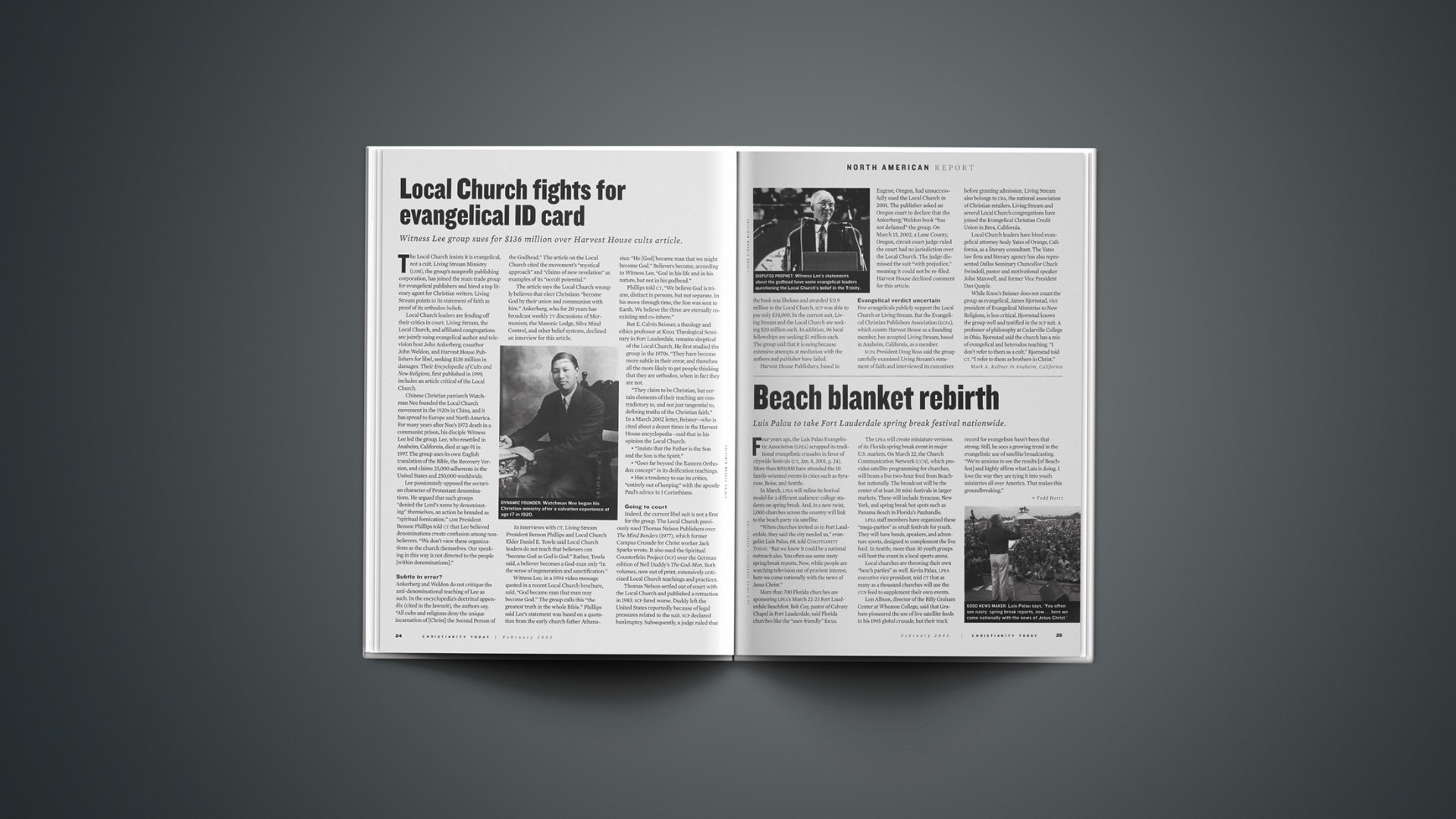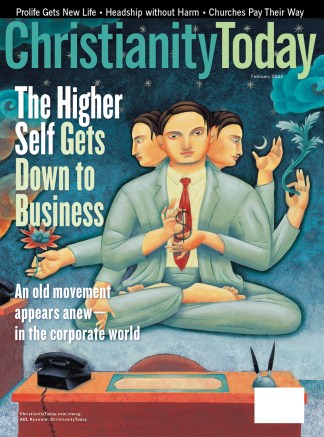The Local Church insists it is evangelical, not a cult. Living Stream Ministry (LSM), the group’s nonprofit publishing corporation, has joined the main trade group for evangelical publishers and hired a top literary agent for Christian writers. Living Stream points to its statement of faith as proof of its orthodox beliefs.
Local Church leaders are fending off their critics in court. Living Stream, the Local Church, and affiliated congregations are jointly suing evangelical author and television host John Ankerberg, coauthor John Weldon, and Harvest House Publishers for libel, seeking $136 million in damages. Their Encyclopedia of Cults and New Religions, first published in 1999, includes an article critical of the Local Church.
Chinese Christian patriarch Watchman Nee founded the Local Church movement in the 1920s in China, and it has spread to Europe and North America. For many years after Nee’s 1972 death in a communist prison, his disciple Witness Lee led the group. Lee, who resettled in Anaheim, California, died at age 91 in 1997. The group uses its own English translation of the Bible, the Recovery Version, and claims 25,000 adherents in the United States and 250,000 worldwide.
Lee passionately opposed the sectarian character of Protestant denominations. He argued that such groups “denied the Lord’s name by denominating” themselves, an action he branded as “spiritual fornication.” LSM President Benson Phillips told CT that Lee believed denominations create confusion among nonbelievers. “We don’t view these organizations as the church themselves. Our speaking in this way is not directed to the people [within denominations].”
Subtle in error?
Ankerberg and Weldon do not critique the anti-denominational teaching of Lee as such. In the encyclopedia’s doctrinal appendix (cited in the lawsuit), the authors say, “All cults and religions deny the unique incarnation of [Christ] the Second Person of the Godhead.” The article on the Local Church cited the movement’s “mystical approach” and “claims of new revelation” as examples of its “occult potential.”
The article says the Local Church wrongly believes that elect Christians “become God by their union and communion with him.” Ankerberg, who for 20 years has broadcast weekly TV discussions of Mormonism, the Masonic Lodge, Silva Mind Control, and other belief systems, declined an interview for this article.
In interviews with CT, Living Stream President Benson Phillips and Local Church Elder Daniel E. Towle said Local Church leaders do not teach that believers can “become God as God is God.” Rather, Towle said, a believer becomes a God-man only “in the sense of regeneration and sanctification.”
Witness Lee, in a 1994 video message quoted in a recent Local Church brochure, said, “God became man that man may become God.” The group calls this “the greatest truth in the whole Bible.” Phillips said Lee’s statement was based on a quotation from the early church father Athanasius: “He [God] became man that we might become God.” Believers become, according to Witness Lee, “God in his life and in his nature, but not in his godhead.”
Phillips told CT, “We believe God is triune, distinct in persons, but not separate. In his move through time, the Son was sent to Earth. We believe the three are eternally co-existing and co-inhere.”
But E. Calvin Beisner, a theology and ethics professor at Knox Theological Seminary in Fort Lauderdale, remains skeptical of the Local Church. He first studied the group in the 1970s. “They have become more subtle in their error, and therefore all the more likely to get people thinking that they are orthodox, when in fact they are not.
“They claim to be Christian, but certain elements of their teaching are contradictory to, and not just tangential to, defining truths of the Christian faith.”
In a March 2002 letter, Beisner—who is cited about a dozen times in the Harvest House encyclopedia—said that in his opinion the Local Church:
- “Insists that the Father is the Son and the Son is the Spirit.”
- “Goes far beyond the Eastern Orthodox concept” in its deification teachings.
- Has a tendency to sue its critics, “entirely out of keeping” with the apostle Paul’s advice in 1 Corinthians.
Going to court
Indeed, the current libel suit is not a first for the group. The Local Church previously sued Thomas Nelson Publishers over The Mind Benders (1977), which former Campus Crusade for Christ worker Jack Sparks wrote. It also sued the Spiritual Counterfeits Project (SCP) over the German edition of Neil Duddy’s The God-Men. Both volumes, now out of print, extensively criticized Local Church teachings and practices.
Thomas Nelson settled out of court with the Local Church and published a retraction in 1983. SCP fared worse. Duddy left the United States reportedly because of legal pressures related to the suit. SCP declared bankruptcy. Subsequently, a judge ruled that the book was libelous and awarded $11.9 million to the Local Church. SCP was able to pay only $34,000. In the current suit, Living Stream and the Local Church are seeking $20 million each. In addition, 96 local fellowships are seeking $1 million each. The group said that it is suing because extensive attempts at mediation with the authors and publisher have failed.
Harvest House Publishers, based in Eugene, Oregon, had unsuccessfully sued the Local Church in 2001. The publisher asked an Oregon court to declare that the Ankerberg/Weldon book “has not defamed” the group. On March 15, 2002, a Lane County, Oregon, circuit court judge ruled the court had no jurisdiction over the Local Church. The judge dismissed the suit “with prejudice,” meaning it could not be re-filed. Harvest House declined comment for this article.
Evangelical verdict uncertain
Few evangelicals publicly support the Local Church or Living Stream. But the Evangelical Christian Publishers Association (ECPA), which counts Harvest House as a founding member, has accepted Living Stream, based in Anaheim, California, as a member.
ECPA President Doug Ross said the group carefully examined Living Stream’s statement of faith and interviewed its executives before granting admission. Living Stream also belongs to CBA, the national association of Christian retailers. Living Stream and several Local Church congregations have joined the Evangelical Christian Credit Union in Brea, California.
Local Church leaders have hired evangelical attorney Sealy Yates of Orange, California, as a literary consultant. The Yates law firm and literary agency has also represented Dallas Seminary Chancellor Chuck Swindoll, pastor and motivational speaker John Maxwell, and former Vice President Dan Quayle.
While Knox’s Beisner does not count the group as evangelical, James Bjornstad, vice president of Evangelical Ministries to New Religions, is less critical. Bjornstad knows the group well and testified in the scp suit. A professor of philosophy at Cedarville College in Ohio, Bjornstad said the church has a mix of evangelical and heterodox teaching. “I don’t refer to them as a cult,” Bjornstad told CT. “I refer to them as brothers in Christ.”
Copyright © 2003 Christianity Today. Click for reprint information.
Related Elsewhere
Living Stream Ministry operates several websites including WatchmanNee.org and WitnessLee.org. History of the group and their beliefs can be found at Local-Church-History.org.










